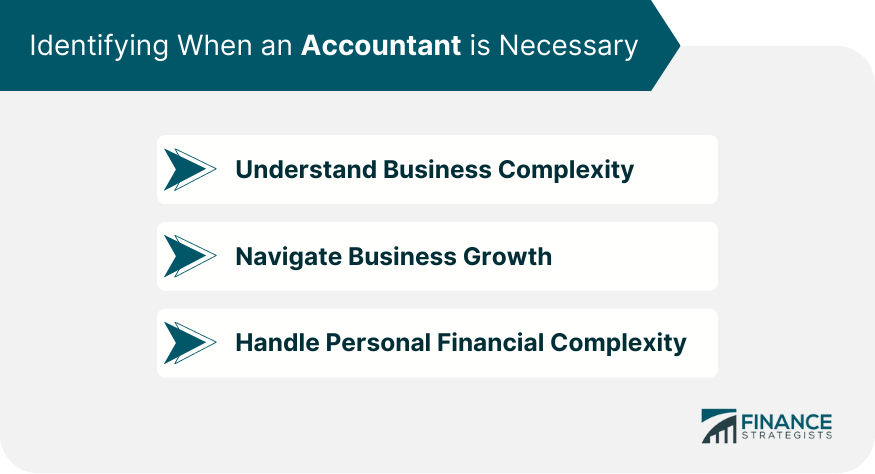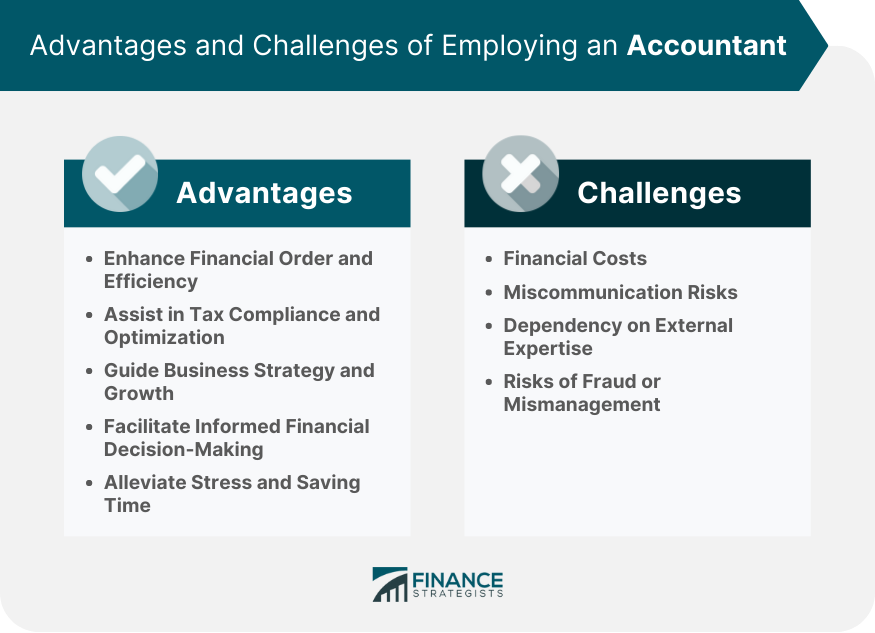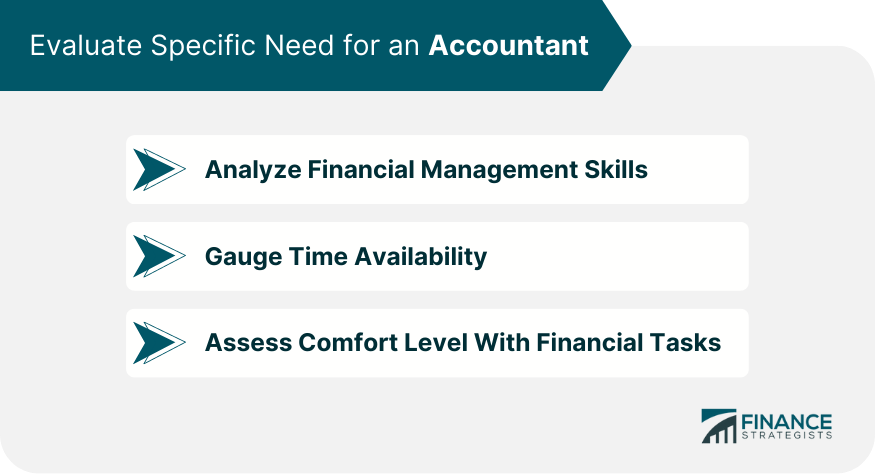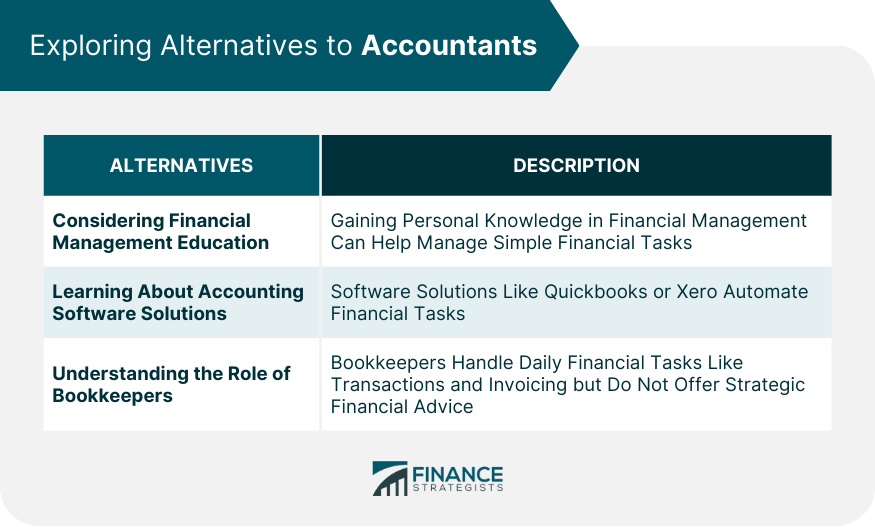The need to hire an accountant will depend on your financial circumstances and complexity. An accountant's role in financial activities is vital. They excel in recording, interpreting, and analyzing financial data, ensuring accuracy, timely tax payments, and providing insights into financial well-being. For individuals, hiring an accountant is beneficial for complex tax situations, multiple properties, or significant investments. In the case of small businesses, accountants streamline processes, ensure tax compliance, offer strategic advice, and save time. However, it's important to consider costs and dependency risks. Alternatives include accounting software, bookkeeping, or self-education in financial management. Assess your financial complexity, available time, and comfort with financial tasks to determine if an accountant is needed. An accountant's expertise supports sound financial decisions, profitability strategies, tax optimization, and legal compliance. As businesses grow and transactions become more complex, an accountant's role becomes vital. They can manage a wider range of financial tasks, such as inventory accounting, depreciation, complex tax filings, and financial projections, which may be beyond the capacity of an individual or small business owner. As a business expands, it may face more intricate tax issues, increased regulatory scrutiny, and more significant financial decisions. Accountants can help navigate these complexities, provide strategic financial advice, and manage growth sustainably and profitably. For individuals with complex financial situations, such as owning multiple properties or having substantial investments, hiring an accountant can be beneficial. They can optimize tax deductions, provide estate planning advice, and ensure regulatory compliance, freeing individuals from the complexities of personal financial management. Accountants can streamline financial processes, minimize errors, and ensure accurate financial reporting. This level of efficiency can help improve cash flow, reduce unnecessary expenses, and improve the financial health of a business or individual. Tax laws are complex and constantly changing. Accountants are well-versed in tax codes and can ensure you or your business are in compliance with the law. They can also identify tax-saving opportunities and strategies, ensuring you pay no more tax than necessary. Accountants can provide strategic financial advice, helping businesses plan for growth, secure funding, or prepare for a sale or acquisition. They can provide invaluable insights into financial trends, business performance, and market conditions. With their financial expertise, accountants can provide a holistic view of your financial situation. They can help you make informed decisions about investments, budgets, and financial planning. Managing finances, especially in a business context, can be time-consuming and stressful. Hiring an accountant frees up time that can be better spent on core business activities or personal pursuits. Hiring an accountant can be expensive, especially for small businesses or individuals with limited resources. It's important to weigh the cost of hiring an accountant against the potential financial benefits and savings they can provide. Like any external advisor, there can be risks of miscommunication with an accountant. It's crucial to establish clear lines of communication and understand the services your accountant will provide. There can be a risk of becoming overly dependent on an accountant for financial decision-making. It's important to remain engaged with your financial situation and not delegate all responsibility and oversight. Although rare, there's a risk of fraud or mismanagement when working with an accountant. It's crucial to carefully vet any accountant you hire and ensure they have proper certification and a solid professional reputation. One's own financial skills play a significant role in deciding whether to hire an accountant. If you're comfortable managing finances and have a good understanding of financial laws and regulations, you may not need an accountant. Your time is a crucial factor. If you find managing your finances takes up too much of your time, it may be worth considering hiring an accountant. Your comfort level with managing financial tasks is also a key consideration. If dealing with finances makes you uncomfortable or anxious, hiring an accountant could bring you peace of mind. Modern accounting software can handle many of the tasks that an accountant can. They can be a cost-effective solution for small businesses or individuals with straightforward financial situations. Bookkeepers can manage many day-to-day financial tasks at a lower cost than accountants. However, they may not have the expertise to provide strategic financial advice or navigate complex tax issues. For those willing to invest time and effort, financial management education can provide the skills necessary to handle many financial tasks. This can be a cost-effective alternative to hiring an accountant for some. The decision to hire an accountant depends on your unique financial circumstances and needs. Accountants play a crucial role in maintaining financial order, ensuring tax compliance, providing strategic advice, and saving time. They enhance efficiency, optimize tax obligations, guide business growth, facilitate informed decision-making, and alleviate stress. However, it's important to consider the financial costs, risks of miscommunication and dependency, and the potential for fraud or mismanagement. Assessing your financial management skills, time availability, and comfort level with financial tasks can help determine if hiring an accountant is necessary. Alternatively, exploring alternatives such as accounting software, bookkeepers, or financial management education can provide cost-effective solutions for straightforward financial situations. Ultimately, the goal is to make informed decisions that support your financial well-being and align with your specific needs and circumstances.Do You Need an Accountant?
Identifying When an Accountant is Necessary
Understanding Business Complexity
Navigating Business Growth
Handling Personal Financial Complexity

Advantages of Employing an Accountant
Enhancing Financial Order and Efficiency
Assisting in Tax Compliance and Optimization
Guiding Business Strategy and Growth
Facilitating Informed Financial Decision-Making
Alleviating Stress and Saving Time
Challenges of Hiring an Accountant
Assessing the Financial Costs
Addressing Miscommunication Risks
Managing Dependency on External Expertise
Navigating Risks of Fraud or Mismanagement

Evaluating Specific Need for an Accountant
Analyzing Financial Management Skills
Gauging Time Availability
Assessing Comfort Level With Financial Tasks

Exploring Alternatives to Accountants
Learning About Accounting Software Solutions
Understanding the Role of Bookkeepers
Considering Financial Management Education

Conclusion
Do You Need an Accountant? FAQs
You may need an accountant for personal finances if you have complex financial situations, such as owning multiple properties, substantial investments, or complicated tax situations.
Hiring an accountant can streamline financial processes, ensure tax compliance, provide strategic financial advice, and save you time, allowing you to focus on other aspects of your business.
Some potential challenges can include the financial cost of hiring an accountant, risks of miscommunication, potential over-dependency on external advice, and the rare risk of fraud or mismanagement.
Yes, alternatives include using accounting software, hiring a bookkeeper for daily financial tasks, or investing in financial management education to handle financial tasks yourself.
You should consider your financial complexity, the time you can devote to financial management, your comfort level with financial tasks, and your long-term business goals or personal financial health.
True Tamplin is a published author, public speaker, CEO of UpDigital, and founder of Finance Strategists.
True is a Certified Educator in Personal Finance (CEPF®), author of The Handy Financial Ratios Guide, a member of the Society for Advancing Business Editing and Writing, contributes to his financial education site, Finance Strategists, and has spoken to various financial communities such as the CFA Institute, as well as university students like his Alma mater, Biola University, where he received a bachelor of science in business and data analytics.
To learn more about True, visit his personal website or view his author profiles on Amazon, Nasdaq and Forbes.











